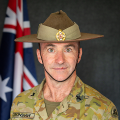An earlier version of this review was originally published in Witness: The Voice of Victorian Baptists, No.3 (April 2009), Exclusive Web Content.
The Australian Defence Force (ADF) is increasingly coming alongside the Australian community with aid and other support, such as with Operation Bushfire Assist and Operation COVID-19 Assist. As an Army chaplain (part-time) I (Darren) was reminded of this book that my partner Jenni and I read and reviewed years ago. It has lessons from Salvation Army chaplaincy that I find relevant to Australian Army chaplaincy but also for ADF members who find themselves coming alongside other Aussies in a practical, emotional and/or spiritual supportive role.
Don Woodland describes life as a jigsaw puzzle. Each day we add another piece, and over time the picture changes and grows. Experiences come that bump the table and we need time and space to gently push the pieces back together to restore our picture. Sometimes, tragically, circumstances can be so devastating that our lives feel out of control as our jigsaw is blown apart. The role of a chaplain is to come alongside and help the person start to pick up what pieces they can find, make some sense of their situation, and begin the journey of restoration and healing.
Don has been a chaplain for over forty-five years. He started by volunteering to help emergency service personnel in small towns where he ministered as a Salvation Army Officer, leading to appointment as chaplain to fire and police services. He attended house fires and car crashes, the Kempsey bus crash, Chiltern backpackers fire, Thredbo landslide, the Port Arthur massacre, and the Newcastle earthquake. His highest accolade, after being with two families whose five children drowned, “Don ministered to our family as you would have expected Jesus to.”
We heard him interviewed on ABC radio after Black Saturday, which he described as the worst tragedy he had ever seen. He explained the path to recovery for communities affected by the bushfires and observed that the people of Marysville needed to get their feet back on the soil of their land to help their recovery.
His approach to helping people has always been to meet them on their own territory, not to just say “See you at church on Sunday”. He is convinced of the need to deal with the whole person – body, mind, and spirit. That means starting with physical recovery and material aspects, then helping through emotional release and expression of the sorrow. It also very importantly includes the spiritual dimension: getting in touch with personal values, finding inner peace, being able to forgive, and connecting with God as the source of life to the full.
Don Woodland's autobiography is an inspiring and heartfelt read, especially relevant for those finding themselves alongside people who are trying to pick up the pieces and rebuild their lives.










